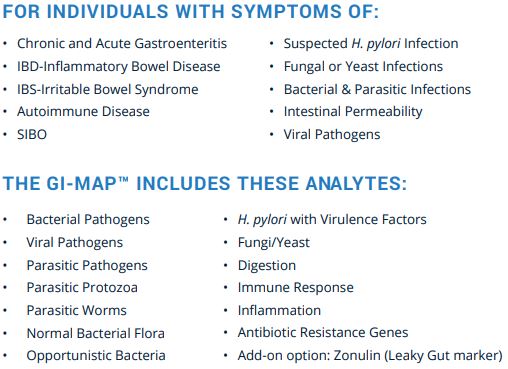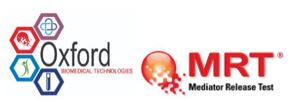Lab Services Offered at NCT

GI-MAP Stool Analysis (GI-Microbial Assay)
GI-MAP is a stool analysis that uses advanced DNA testing to assess a patient’s microbiome by measuring levels of healthy bacteria, pathogenic bacteria, parasites, yeast, and viruses that can cause disease, disrupt the normal microbial balance, and contribute to chronic GI illness. It also uses advanced metabolic testing for inflammation, immune function, digestion, and absorption.


MRT: Food & Chemical Sensitivity Testing
Mediator Release Testing (MRT) is a blood test that checks your immune system response (or non-response) to 170 foods and chemicals. MRT is a functional live cell analysis that identifies foods and chemicals which provoke the release of mediators that cause pain and inflammation. The results of the blood test are used to create an individualized healthy eating plan for significantly reducing or eliminating symptoms. The specially trained Registered Dietitian then works with you, teaching you how to eat using the LEAP (Lifestyle, Eating, And Performance) protocol, and sleuthing out any potential allergies or intolerances that may also be present.

NUTRITIONAL: Intracellular Micronutrient Analysis
SpectraCell’s micronutrient blood test provides the most comprehensive nutritional analysis available by measuring functional deficiencies at the cellular level. It is an assessment of how well the body utilizes 31 vitamins, minerals, amino/fatty acids, antioxidants, and metabolites, while conveying the body’s need for these micronutrients that enable the body to produce enzymes, hormones, and other substances essential for proper growth, development, and good health. Repletion recommendations are made based on need.

GENETICS: MTHFR (Methylenetetrahydrofolate Reductase)
SpectraCell tests for the MTHFR gene mutation. Mutations in this enzyme can affect the metabolism of homocysteine–causing accumulation–and therefore, impair methylation. Methylation is a biochemical process that is involved in numerous functions including cellular repair, energy production, detoxification, neurotransmitter production, and immunity, among others. MTHFR mutations have been linked to increased risk for cardiovascular disease, blood vessel damage, blood clots (thrombosis), stroke, and degenerative aging.
Spectracell’s MTHFR Genotyping detects mutations for: C677T and A1298C genes.
CARDIOVASCULAR: Lipoprotein Particle Profile
SpectraCell’s Advanced Lipoprotein Particle Profile (LPP) measures lipoprotein size and density; cardiovascular risk stratification; and also includes triglycerides and traditional cholesterol screening. Fasting is required for this panel.

